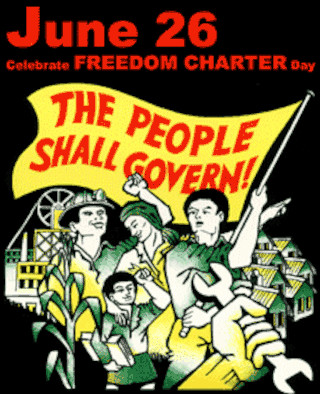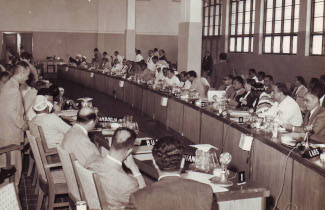1955 was a fundamentally exceptional year, a transformative year for the international community, the global South and South Africa. In April 1955, the Bandung Conference was held in Indonesia. While this conference is often remembered as a pivotal moment in world history, in 1955 South Africa also adopted the Freedom Charter, whose fundamental principles were based on justice, humanity, friendship, equality, peace and solidarity. Values and ideals that are now firmly enshrined in South Africa's constitution and foreign policy.
Both of these events took place under the watchful eye of the then African National Congress (ANC) president Nkosi Albert Luthuli. I believe this article is also timely given the ongoing investigation into his death.
In January 1955, just a few months before the Bandung Conference and the Congress of the People, Nkosi Albert Luthuli in an interview with Drum magazine, described the circumstances facing the liberation movement in South Africa. He spoke at length about the ANC's campaigns at the time and its internationalism. One quote stands out as an indication that the ANC may have been considering its internationalism during the Cold War and preparing to enter the world of post-liberation states. He said: "Personally, I have many friends in the West, and at present I have no friends in the East. But that doesn't mean that Congress tends to lean towards the West."

In this interview he also stated: "I believe the Congress generally follows Nehru's foreign policy; we want to be neither East nor West, but neutral and welcome cooperation from those on both sides who will help us advance our aspirations for freedom in a democratic setup."
In many ways, this point aptly describes the reality of the time, the reality that colonial hegemony was entrenched, despite the liberation of several states, including India, Indonesia, Egypt, Libya, the Gold Coast, represented by Kwame Nkrumah's close ally, Kojo Botsie, to name a few.
Origins
In June 1954, on the sidelines of an international conference to discuss the Korean crisis and Indochina held in Geneva, Chinese Premier Chou En-Lai accepted an invitation to visit India from V. K. Krishna Menon, India's representative at the conference.
Indonesia's commitment to solidarity between Africa and Asia and the global South in general was demonstrated later in 1954 when Prime Minister Nehru invited the then Indonesian Prime Minister Dr. Ali Sastroamidjo to New Delhi to discuss preparations for a proposed conference between African and Asian states. In a joint statement issued on 25 September 1954, Nehru and Sastroamidjojo stressed that "the purpose of the Asian-African Conference was to promote unity and peace." The preparatory meeting for the Bandung Conference was held in December 1954 in Bogor, Indonesia.
Nehru's proposals to invite about 30 countries to the conference, to exclude controversial issues and to include broad issues on the agenda under the five principles of peaceful coexistence on which India and China had earlier agreed, were accepted as the guiding principles on which the conference was to act. These principles were (i) Mutual respect for sovereignty and territorial integrity, (ii) Mutual non-aggression, (iii) Non-interference in each other's internal affairs, (iv) Equality and mutual benefit, and (v) Peaceful coexistence.
Based on these principles, the organizers of the Bandung Conference - Burma, Pakistan, Ceylon (Sri Lanka) and India with Ruslan Abdulgani, then Secretary General of the Indonesian Ministry of Foreign Affairs as coordinator - refused to consider inviting the then South African government to the conference, instead a warm invitation was extended to the liberation movement in South Africa.
A turning point in human history
The leaders of the one and a half billion people (at the time), comprising more than half of the human race, included giant figures in the world's anti-colonialist and anti-imperialist struggles for the right to self-determination and independence.
Among these giants, the South African liberation movement was represented Moses Kotan and Maulvi Cachalia. When the apartheid government learned of their intentions, it refused to issue them travel documents. Nevertheless, they managed to reach London, where the Indian High Commission issued them travel documents that allowed them to visit not only Indonesia, but also Egypt, India, Poland and China.
Kotane reported on the conference from Indonesia and what he wrote captured the imagination of freedom-loving South Africans. Kotane wrote: "Although the conference has been held behind closed doors for a week, the interest of the local population has not waned. Every day crowds gather outside the hotels and houses where the delegates are staying. They stand there from six in the morning until ten in the evening. Whenever ministers or heads of delegations come or go, there is great excitement. Then the crowds push forward and have to be pushed back by the military police who are in charge of security."
"In any case, there is nothing violent or hostile in the relations and attitude of the military police towards the population. Everything is peaceful and friendly. There are many unofficial observers and hundreds of journalists."
I'm sure Nkosi Albert Luthuli, who just a few months earlier was lamenting his lack of interaction with the East, would be very excited by what he would read.
In solidarity, the leaders sent warm greetings and messages of support to the conference. The African National Congress (ANC), through its then Acting General Secretary Oliver Tambo, sent a message of solidarity to the Bandung Conference: "The significance of this conference is that the sponsors and the people who are meeting have themselves been subject to exploitation and foreign domination by Western colonial powers for centuries and have now decided to take the fate of their people and their countries into their own hands... They want to see the permanent independence of their newly founded democracies and the liberation of those who are still under the yoke of foreign domination and racial oppression."
It was only natural that the Conference took a firm moral stand against colonialism, imperialism, racism and apartheid by adopting the following resolution: "We condemn the policies and practices of racial segregation and discrimination that form the basis of governance and human relations in large parts of Africa and other parts of the world. Such conduct is not only a gross violation of human rights but also a denial of the dignity of the human person."
Where are we now?
President Albert Luthuli, Nobel laureate, sent a message to the Bandung Conference, part of which read: "We live in a very turbulent world, which someone aptly called 'a madhouse'. My prayer and wish is that this conference may help to bring sanity to this crazy world of ours, which is suffering from a paralyzing disease caused by fear and jealousy among nations."
Our current realities are far from ideal. We live in extremely dangerous times, the lines between conflict, social and economic problems have blurred beyond the limits of existence. There are certain values and principles that we chose to enshrine 70 years ago, and although we have these values on paper, we also have Sudan, Congo, Gaza, Ukraine, the Sahel and many other places where humanity is being held hostage and people are victims of the worst that human existence has to offer.
Yet, despite these shameful horrors, 1955 was a happy accident of sorts, the Bandung Conference and the Congress of the People taking place just months apart, both having an impact that changed history for millions of people around the world.
Considering what we face as humanity, we must remember 1955 as one of the torchbearers that lights the way, and maybe, just maybe, our children will be protected from the worst case scenarios of our time. This is surely our generational duty.
Jaimal Anand
Thediplomaticsociety/gnews.cz - GH



